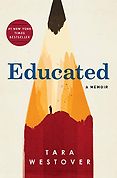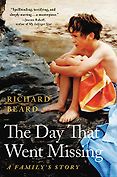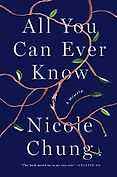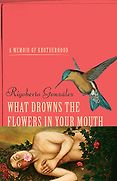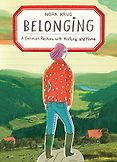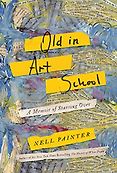You are chair of the National Book Critics Circle Awards’ autobiography committee. So you’re in a good position to tell us: what ingredients make good autobiography?
We on the committee talk about this a lot. We meet a couple of times over the year and we do a lot of emailing back and forth in between because we are scattered all over the country, and that’s one of the paramount questions.
Voice is crucial. We also look for authenticity, which is a tricky thing with memoir because the genre is morphing all the time. There’s a question, really, as to how literally accurate a memoir has to be. If someone is writing about childhood, and they weren’t taking notes as a kid, can they include dialogue from way back then? Is that cheating? I should add—I am a journalist, and I believe that nothing in a memoir should be made up. But that is an enormous discussion, not just on the NBCC committee but in the world of writing in general.
Get the weekly Five Books newsletter
So: voice, authenticity, a good story and a certain plumbing of one’s . . . not just life, but soul. The author should be always trying to figure out: ‘what did I think?’ and ‘who am I?’ and ‘why did this happen?’ and ‘what does this mean?’ I think, also, that we’re interested in a book that’s not just one person’s story alone, but that has some universal theme, something that shows how a person’s life fits into the world or into a particular time.
Absolutely. Before we move onto the books, we’ve been using two words here almost interchangeably: autobiography and memoir. I suppose memoir is a sub-genre of autobiography. But could you clarify for our readers how these terms are normally applied?
Yes. Autobiographies, in general, are works of scholarship. Memoirs are more personal. Memoir often is just a certain sliver of a person’s life, not the story of one’s entire life. Autobiography usually doesn’t involve a person’s inner life as much or emotional journey, as a memoir does. And with memoir, there’s a lot more leeway as to how you might tell the story.
As you notice, one of the memoirs on this list is a graphic novel, it’s told mainly through visuals with some text. Last year, too, we had a finalist that was told in comic book form—Thi Bui’s memoir about her parents leaving Vietnam during the war, and about her growing up in America as an immigrant. It would be harder to do a full autobiography in this way. Generally, an autobiography is straight chronological narrative.
Typically, the National Book Critics Circle names five finalists per category. For 2019, you’ve chosen six autobiographical titles. Why?
Yes. This year we got deadlocked. My committee happened to have an even number of people; we went through a number of votes but people were fervent about the books they supported.
The shortlist, which is what we’re looking at, is determined by the committee, but the winners will be determined by the entire board, so we won’t get deadlocked again. There will be one winner!
Let’s look at the books that made the shortlist. Perhaps we could start with Tara Westover’s, Educated. In it, Westover describes growing up in rural Idaho in a Mormon fundamentalist family, before eventually departing to study at Harvard and Cambridge. I’ve seen it reviewed and recommended all over the place, not least by Barack Obama. I enjoyed it myself. But could you say: does it deserve all the acclaim?
I think so. She has a remarkable story. All of these books, as you’ve probably noticed, are quite different from one another, with different strengths. With Westover’s book, it’s the story. It is simply so remarkable that people could not put it down.
I like how she wrote it in three sections, and how her voice changes in each section. The first is written from the point of view of herself as a child and I thought that was the strongest section of the book. She had a terrible childhood, I think, by anybody’s standards. I think she knew it was terrible at the time but she didn’t know it was unusual. To her, it was normal. That first section reminded me, in a way, of Angela’s Ashes, which Frank McCourt wrote in the voice of himself as a child. His family was living in abject poverty. But when you’re a kid, you don’t really understand how hard life is when everybody around you is living the same way. So, I thought the first section of Educated did that as well.
In the second section, where she starts getting out into the world and realises what a freak she is, her voice changes. She’s not as sure of herself, she’s amazed by what she doesn’t know, and she’s a little terrified by the world and what is expected of her.
“This was a true coming-of-age memoir about tenacity and the transformative power of education”
And then the last section was the hardest to read because that’s where she has come into her own, but realises she still wants her family—and her family is not prepared to accept her now that she has changed so much. It was heart-breaking. She keeps going home and going home and going home, and hoping they will be different and that they will accept her. And they don’t.
This was a true coming-of-age memoir about tenacity and the transformative power of education, but it was also about the pull of family and the need for love.
You mentioned ‘authenticity’ earlier, and the difficulties of writing so long after the fact. This book contains discussions of the fallibility of memory: although she has her diaries to look back at, what she remembers and how she interprets the diaries changes from year to year.
Yes.
Is this an issue that dogs memoir as a genre? That variability in how people remember the same events?
I think it does. I think it’s one of the defining characteristics of memoir: that people remember things a certain way, and their memory may or may not be accurate. They’re often challenged by people who grew up with them or who experienced the same thing and remember it in a completely different way. Often these are things you cannot really research. They’re not the facts of the world at that time but they’re personal things that happened to you or your family.
Westover is challenged as well by people in her family who tell her that what she’s experiencing is not actually happening—her older brother in particular. A sort of gas-lighting occurs.
Sometimes a memoirist can’t find out the truth, or the truth changes, or it shifts as the writer’s perspective shifts. Rigoberto Gonzalez said in an interview about his new memoir that he purposely did not check his memories with anyone else’s; he wanted only his own perspective. And Richard Beard, in his book, kept running into places where memory—his own, and others’—contradicted documented fact.
Well, let’s discuss that book: Richard Beard’s, The Day That Went Missing. Could you tell me more about it?
This is the story: In midlife, he has some sort of crisis—I don’t think he explains what the crisis is but I don’t think it really matters—and he decides to go back and try to understand something terrible that happened when he was a little boy. When he was 11 years old, his family went on vacation to the Cornish coast and he and his little brother Nicky, who was nine, were playing in the waves. And then this big wave comes along with an undertow and it sucks them both out to sea. He tries to save his brother, he’s not able to and there’s a point where he has to make a decision to abandon Nicky and save himself. He manages to get back to shore but Nicky dies. That’s how the book opens.
From there, he tries to remember what happened after that. He has few memories. He doesn’t even know the date this happened because his family never talked about it. They buried Nicky and they went back and finished their holiday in this place on the Cornish coast and Beard went back to school and as he recalls it, no one ever spoke about it again.
So he starts interrogating this terrible thing. His father has since died, but he talks to his mother, and he talks to the first responders, and he reads the newspaper stories, and he talks to his other brothers, and he talks to the headmaster at his school, and he starts piecing together what happened. He goes back and revisits where this took place. Walks the coastal path, finds the cove where they were dragged out to sea.
Five Books interviews are expensive to produce. If you're enjoying this interview, please support us by donating a small amount.
He’s filled with guilt—guilt for surviving, for not saving Nicky, for coaxing Nicky into the water in the first place. And he’s filled with rage at his father for not trying to rescue his son, and for never speaking about the incident again.
But he also discovers that many of his memories are not accurate.
In his memory, he just went back to school and everything carried on as though nothing had happened. But when he talks to the school headmaster all these years later, the headmaster says, ‘No, don’t you remember? You lay in bed and screamed every night and my wife went in to comfort you.’ So Beard’s book is about the fallibility of memory. It’s about how crippling silence can be. It’s about guilt. And it’s about revisionist history—for instance, the way that his mother remembers things differently and in a way that . . . almost makes the death easier for her to accept. She remembers that Nicky wasn’t that smart of a kid, and he wasn’t that great of an athlete, neither of which is true. But memories change, perhaps to help you protect yourself.
It’s a really angry book too, though written with such restraint. I just found that tone so admirable.
You mentioned the importance of portraying a particular place and time. This book must say a lot about British culture of the time, that sense of a stiff upper lip, the emotional repression.
Yes, he talks about that a lot. I’m trying to imagine how awful it must have been for him to broach this with his mother. I mean, no one in the family had talked about this for 30 years. There’s a really interesting scene when his mother tells him that all of Nicky’s things were packed away in a little red trunk in the attic. Richard Beard went up into the attic and there was no little red trunk. There were some of Nicky’s things scattered around in various boxes, but no little red trunk. It just seemed so symbolic to me that she had put everything away in this mythical trunk and locked it in the attic, never to be thought of again.
Your third choice also deals with family relationships: Nicole Chung’s All You Can Ever Know, about her experience with trans-racial adoption and tracking down her birth family after she herself became a mother. What marks this book out?
Well, again, I think that it is a combination of the voice and the story, and also in this case the timeliness of it. This is something that people are just beginning to talk about openly.
There’s always been this idea that America is a big melting pot and we’ve had international adoption for a long time. Romanian orphans, and Russian orphans, and Chinese orphans, and Korean babies: we’ve moved around the world adopting these children and bringing them here to the land of plenty, to blend into our melting pot. But a melting pot is not reality, and this is not what it feels like for these children. I think for a long time adopted children stayed quiet about how they felt—with closed adoptions there was no way for a child to find a birth family, and there was also a sense of not wanting to hurt the feelings of adoptive parents.
“If you find out where you come from, it may not be what you’re expecting”
Chung, though, writes about these things quite openly, and navigates the complicated and sometimes conflicting emotions skilfully. She writes about how isolated she felt growing up as a Korean girl in a white family, in a very white neighbourhood: she always had this sense that she didn’t really belong and that no one really understood her. Nobody looked like her. She felt quite alone. So that’s part of the book.
The other part is her search for her birth family, which does not turn out in the way that one might expect. She did find her birth mother and father, who had divorced, and she found a sister that she had not known about. But it was not an entirely positive experience. Her mother was apparently a pretty brutal person, who beat her children. And so, it’s about finding her place in the world, and examining this idea of multicultural or interracial adoption but then it’s also about what figuring out what family is.
She formed a very tight bond with her sister, they became very close. But with her birth mother? Not so much. So it’s also sort of a reality check: if you find out where you come from, it may not be what you’re expecting. What you learn may not be what you had wanted to learn.
Thank you. Let’s discuss Rigoberto González, who is best known as a poet. His memoir What Drowns the Flowers in Your Mouth was not one I’d come across until your shortlist came out. Have I been missing out?
Well, he is a remarkable writer, both poet and memoirist. This book is just beautifully written. So yes, I think you have been missing out. But—if I can just put a little plug in here for the NBCC—the books that we consider are not nominated, and there’s no entry fees as there are for other significant awards, so that opens up our competition to the world of books in a way that other competitions are not. We read literally hundreds of books over the course of the year.
Rigoberto González’s book was published by the University of Wisconsin Press. They’re a very good press, but they are not huge. So when we are looking for books, we keep an eye out and look for books that are not necessarily being reviewed everywhere, like Educated was. The fact that a book is lesser known is not going to stop us.
Hopefully with these awards we remind people that there are a lot of great books out there that they might not be aware of.
“The book is a window into a life that a lot of us know nothing about”
A few years ago, before I was on the board, a collection of short stories won the National Book Critics Circle award for fiction. It was from a tiny press called Lookout Books, which publishes two books a year. This was a collection of short stories, so it’s even more remarkable that it won the award for fiction.
Gonzalez’s book is the story of growing up a Latino and gay in a very troubled family. His mother dies, his family deserts the family, and it’s a hard, hard life. It’s just a really remarkable story about his relationship with his father and, primarily, his brother, and about pulling away and finding a new life. It’s just beautifully written.
The book is a window into a life that a lot of us know nothing about: going back and forth across the border, living in small towns, intrafamilial strife, and finally busting out and finding a bigger life. He becomes an academic and a poet but he feels this pull back home again to these small dusty towns where his brother still lives. It’s about the relationship between him and his brother, but it’s a coming of age story as well.
We mentioned Nora Krug’s book, Belonging, earlier because it is in a very interesting format. It’s a graphic memoir.
Yes!
It’s an interesting choice. Could you talk me through it?
You know, she had such an interesting story. She felt guilt about her family’s German past—she wasn’t sure if there was a Nazi connection, although she suspected there might be.
The way that she tells this story is very visual, like a scrapbook. She has photographs. Sometimes they’re just old photographs that she bought at a flea market, they aren’t even her own family’s photos. Some of them are her family’s, some of them are little newspaper clippings that she found through her research. Some of it is her own words, handwritten. And so, it’s just this sort of patchwork of research and pictures and ephemera and family stories, and it just goes deeper and deeper and deeper.
She does find culpability, on a minor scale. She finds that one of her relatives let Nazis park in his garage, and in order to do that, he had to join the Nazi party. So there are all these complicated themes of guilt and survival, and what you do to get along and live your life in a society that is going insane—and then, how does a family come out of that? It wasn’t her generation and it wasn’t her parent’s generation. This goes back several generations and yet, she had this sense of responsibility, the sense that her family had not done right and she needed to explore that.
Reading about this book has brought me in contact with a German word for a concept we don’t have a literal translation for, ‘Vergangenheitsbewältigung’: the struggle to come to terms with a difficult past. It’s interesting to see this being done at the personal level, the familial level, as well as as a society.
I agree.
In publishing they talk a lot about the importance of ‘universal’ stories. But some of the books we’ve discussed are almost the opposite of that. They are very culturally specific, specific even to a single family.
They are. Another purpose of memoir, I believe, is to give you an insight into a completely different way of living—into what that looks like and feels like. González’s book does that really, really well. I just felt like I was at his side through that whole book. It’s very vivid, it’s very descriptive, not just of himself and what he was going through but also of his surroundings. The Chung, perhaps not as much. But place is not as important in that book, it’s more about family relationships and her own emotional journey than it is about a particular place. And the characters in her book are vivid and unforgettable. So I think what you want memoir to do really depends on the story.
Absolutely. Finally, we can look at the last book of six, Old in Art School: A Memoir of Starting Over. It’s by Nell Painter, a former Princeton historian, and I think the title sums it up. It’s an inspiring story!
It is, but it’s also just really fun to read because she has got a great voice, you know? She has a very distinctive way of writing. Huge personality on the page. Painter was 64 and had studied art, I think, as an undergraduate, years ago, but then became a historian and put it aside.
Now in her sixties, it was not a great time to be doing something all consuming. Her parents are failing, she’s just retired from Princeton, but she decides to go to art school. There she experiences some racism, and quite a bit of ageism. But she’s very self-confident and throws herself into it, and has some pretty tough discussions about what it means to be an artist. She’s told at one point that she may become a painter, but she’ll never be an artist—and she really takes exception to that.
“Her age gives her more impetus to work hard and learn—she has less time to waste”
Her memoir is about trying something new, it’s about going a completely different direction in your life, it’s about following a passion that you’ve had but never nourished and pushing through the resistance. She’s a very lively writer. She’s not afraid of all caps, she just puts it out there, she’s smart and ebullient and funny and sharp, and we loved it for those reasons.
Having been a professional historian, and an adult with plenty of life experience, one feels that perhaps she’s better placed to consider those big questions about art.
Yes, she makes clear that her age and experience gives her perspective the younger students don’t have. Her age also gives her more impetus to work hard and learn—she has less time to waste.
But she also found the more she learned, the harder it got. At one point, one of her instructors was looking for something positive to say about her work and finally said, ‘well, you’re not afraid of paint,’ which I thought it was wonderful, because clearly she’s not afraid of anything.
The author photo that goes with this book is an exuberant picture of her standing in front of this wonderful blue and yellow and green painting that she has done, and it made me excited for the book even before I read it.
I think that’s wonderful. To tie off our discussion, I just thought I’d pose a final question: is this a good time for autobiography as a form?
Oh gosh, yes. Every year sees more and more diversity of voices. And I have to say, I’m happy that we have a diverse shortlist but that’s because these books were so good. We didn’t have any checklist that said, ‘we need a black writer, we need a Latino writer, we need an Asian writer,’ you know? It just happened that these were the great books that we all admired this year.
There’s room for so many more voices now. There’s a hunger for so many more voices now. And the form is always changing. There’s memoir in comic strip form, and memoir in poetry. Eileen Myles wrote a memoir through the observations of her dog—actually, her dead dog. There are memoirs in first person and second person and third person, and there are a lot of books that are now being marketed as hybrid fiction/memoir. Those I have a little more trouble with, because I think memoir still has to be factually true—and when you blend it with fiction, I’m enough of a journalist to say that it then becomes fiction.
But I also am willing to be open-minded and pay attention and look at what’s going on. It’s the most exciting genre, and it has been for some time. Every year there are new voices and new ways of telling stories, and I think it’s great fun.
Read more in the best books of 2019 interview series.
Interview by Cal Flyn, Deputy Editor
February 5, 2019
Five Books aims to keep its book recommendations and interviews up to date. If you are the interviewee and would like to update your choice of books (or even just what you say about them) please email us at [email protected]
